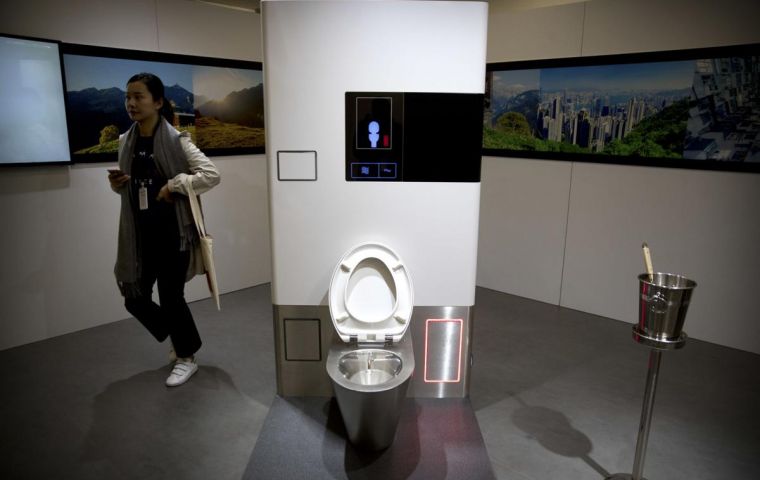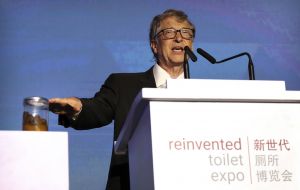MercoPress. South Atlantic News Agency
Bill Gates in China presents his latest revolution: futuristic toilets
 The toilet, which Gates said was ready for sale after years of development, is the brainchild of research projects funded by the Bill and Melinda Gates Foundation
The toilet, which Gates said was ready for sale after years of development, is the brainchild of research projects funded by the Bill and Melinda Gates Foundation  “The current toilet simply sends the waste away in the water, whereas these toilets don’t have the sewer, Gates said
“The current toilet simply sends the waste away in the water, whereas these toilets don’t have the sewer, Gates said U.S. billionaire philanthropist Bill Gates unveiled on Tuesday in Beijing a futuristic toilet that doesn’t need water or sewers and uses chemicals to turn human waste into fertilizer. The Microsoft Corp co-founder, who a day earlier was one of the high profile guests at a major trade event in Shanghai, also lauded the globalized and free trade systems that made the toilet technology possible.
“I honestly believe trade allows every country to do what it’s best at,” he said on Tuesday. “So when I talk about components of this toilet being made in China, others in Thailand, others in the United States - you really want to be bringing together all of that IQ so that you’re getting that combination.”
Gates’ trip comes amid trade tension between China and the United States, the world’s two largest economies, which have slapped tit-for-tat tariffs on goods worth billions of dollars.
The toilet, which Gates said was ready for sale after years of development, is the brainchild of research projects funded by the Bill and Melinda Gates Foundation, the world’s biggest private philanthropy organization. There are multiple designs of the toilet but all work by separating liquid and solid waste.
“The current toilet simply sends the waste away in the water, whereas these toilets don’t have the sewer. They take both the liquids and solids and do chemical work on it, including burning it in most cases,” Gates told Reuters.
He compared the change from traditional toilets to waterless models as similar to development in computing around the time he founded Microsoft in the mid-1970s.
“In the way that a personal computer is sort of self contained, not a gigantic thing, we can do this chemical processing at the household level,” he said.
Gates’ foundation has committed roughly US$ 200 million to the toilet project and expects to spend the same amount again before the toilets are viable for wide-scale distribution.
It is the first time Gates’ foundation has addressed an event in China, where President Xi Jinping is promoting a three-year “toilet revolution” to build or upgrade 64,000 public toilets by 2020 to help boost tourism and economic growth.
Gates said the next step for the project is to pitch the concept to manufacturers, saying he expects the market for the toilets to be over US$ 6 billion by 2030.




Top Comments
Disclaimer & comment rulesCommenting for this story is now closed.
If you have a Facebook account, become a fan and comment on our Facebook Page!